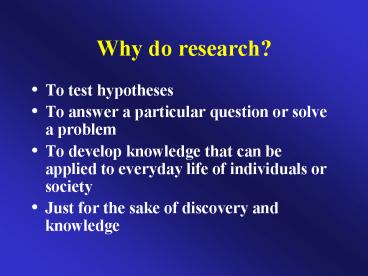Why do research - PowerPoint PPT Presentation
1 / 12
Title:
Why do research
Description:
Discovery of facts; increase knowledge ... no moral valence attached to discovering facts through research ... Study may be useless if deception not used ... – PowerPoint PPT presentation
Number of Views:63
Avg rating:3.0/5.0
Title: Why do research
1
Why do research?
- To test hypotheses
- To answer a particular question or solve a
problem - To develop knowledge that can be applied to
everyday life of individuals or society - Just for the sake of discovery and knowledge
2
Goals vs. Ethics of Science
- Discovery of facts increase knowledge
- Amoral neutral with regard to values or moral
interpretation - Pure science no moral valence attached to
discovering facts through research - What provides the ethical guideposts for science
and scientists?
3
Ethical Practice of Science
- Individual researchers own ethics
- Disciplinary/Professional guidelines
- Government laws and regulations
- Society and culture
4
Ethical Practice of Science
- Fraud
- Fabrication of results
- Selective reporting (of only those data you
like) - Misrepresentation
- Protection
- Failure to replicate
- Peer review
- Whistle-blowing
5
Key aspect of ethics of research potential
benefits of the factual knowledge versus the
risks of the knowledge
- In physics or chemistry
- Do we want to understand the basic properties of
matter and energy? - Do we want to understand the basic chemical
functioning of the brain? - Do we want to discover how to build a better bomb
or chemical weapon?
- In psychology
- Do we want to understand what determines human
behavior? - Do we want to discover ways to control
undesirable behavior of individuals? - How much control over peoples behavior should we
have?
6
1st Priority How are participants treated?
Regulated by guidelines from American
Psychological Association, and from federal
law The exact use and treatment of participants
must be reviewed and approved by review boards
before the research can be done
- Humans
- Institutional Review Board (IRB)
- APA guidelines (Ethical Principles of
Psychologists and Code of Conduct, 1992) - External Peer Review (for projects funded by the
government)
- Non-human Animals
- Institutional Animal Care Use committee (IACUC)
- Animal Welfare Act
- APA SFN guidelines
- External Peer Review (for projects funded by the
government)
7
What is the potential risk?
- Individual participant
- Will the participant suffer any physical or
psychological harm, distress, or discomfort, by
his/her participation in the experiment? - Role of the IRB is to minimize risk to the
participant, and decide whether benefits of the
research outweigh the risks
8
Informed ConsentSubject
agrees to participate after having been fully
informed about the nature and purpose of the
studyException when deception is deemed
necessary to test an important hypothesis
- Must exercise free will to participate
- Subjects must receive a full explanation of
procedures to be used - Potential risks must be made clear
- Must be allowed to discontinue at any time during
experiment, without penalty or pressure - Must be agreed to in writing
9
Use of deception
- What if informed consent gives away the
hypothesis being tested? - What if informed consent biases the participants
responses? - Must decide risk (to subject) of deception
against benefit (i.e., importance of the study) - Study may be useless if deception not used
- Decide if subject would likely refuse to
participate if he/she had been fully informed (no
deception) - Decide if subject is placed in any physical or
psychological jeopardy by the deception - Must provide full debriefing and full disclosure
at the end of the experiment
10
Other important considerations
- Must maintain anonymity and confidentiality
- Must consider risk of placebo (no-treatment
control) - Must consider potential long-term changes in the
participant resulting from being in the
experiment - What is meant by full disclosure?
11
Research using Animals
- Issues in behavioral research
- Historical importance of animal behavioral
research - Comparative value of animal research (including
animal models of human conditions) - Importance to brain science and understanding
brain function - Understanding of ecology and evolutionary
adaptation
12
Research using Animals
- Protections and Review of Use
- Animal Welfare vs. Animal Rights
- Health and well-being is essential to science
- No unnecessary pain or distress
- Current View 3 Rs
- Reduce
- Refine
- Replace

